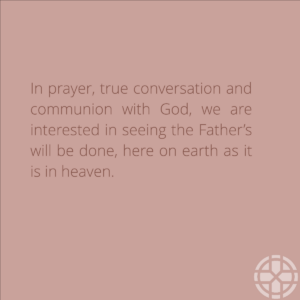

Wednesday March 22, 2023
THE DEVIL LED HIM TO JERUSALEM
Scripture Reading
Luke 4:1-9
Jesus, full of the Holy Spirit, left the Jordan and was led by the Spirit into the wilderness, where for forty days he was tempted by the devil. He ate nothing during those days, and at the end of them he was hungry. The devil said to him, “If you are the Son of God, tell this stone to become bread.” Jesus answered, “It is written: ‘Man shall not live on bread alone.’” The devil led him up to a high place and showed him in an instant all the kingdoms of the world.
And he said to him, “I will give you all their authority and splendor; it has been given to me, and I can give it to anyone I want to. If you worship me, it will all be yours.” Jesus answered, “It is written: ‘Worship the Lord your God and serve him only.’”
The devil led him to Jerusalem and had him stand on the highest point of the temple. “If you are the Son of God,” he said, “throw yourself down from here.
Reflection
We now enter the third test, the third temptation, of Jesus in the wild. His vocation is at stake. He has been named and called by the Father, and the enemy is doing his primary destructive work, knowing all this is at stake. He is seeking to un-name Jesus—to cut off his personhood before the Creator and his ministry of bringing dead things to life before it even begins
In the Madeleine L’Engle science fiction classic, A Wind in the Door, she speaks of people who love as “Namers,” and the demonic creatures that destroy as un-namers. The Father names us, and our name carries our calling, our purpose, our order in a chaotic world. The adversary un-names us, distorts our identity, and seeks to rip it from us as early as possible in life.That is why it is important to walk with the Lord in our younger years with mature guidance and Christ-oriented support; it is in the early years the enemy sought to strip from us our personhood before God.The Father wants to minister to those places of brokenness; our work is to not sweep them under the rug and hope we somehow outgrew lies we believed early on.
The satan, the accuser, has one shot left. In the first test, he aims at Jesus’s use of power, pressing him to use it on himself (the bread). In the second test, he aims at Jesus’s use of privilege, seeking to convince him he can have everything he ever desired without pain or suffering. In this third test, the evil one aims at Jesus’s use of persuasion—tempting him to perform a miracle that will convince all of his message and enable him to skip the unbelief that will inevitably lead him to a cross.
The devil wants Jesus to put the Lord his God to the test, but the nature of that press is toward a noble end—that all would see his deity.
Why is this such a subtle, important, final play of the enemy? I believe the answer lies in Israel’s primary stumbling in their forty years of wilderness wanderings—they asked for things that didn’t derive from the Father’s will, but rather from their own.
It is willfulness, our own will, that Jesus is being challenged to exert. Jesus will use the gift of his volition to heal the sick, raise the dead, and bring the message of life to millennia of souls like you and me. Could the satan get him to exert his own will to get the Father to do his—rather than the other way around?
A friend and fellow leader once suggested that the difference between prayer and magic is determined by knowing whose will is being done. In prayer, true conversation and communion with God, we are interested in seeing the Father’s will be done, here on earth as it is in heaven (Matt. 6:9–13). In magic, which prayer can easily and subtly turn into, we use our will and prayer to get God to do our will. Whether our will being done is expressed in a chain letter full of “just pass this on to seven people and your prayer will be granted,” or is expressed in prayers that rely more on many words (Matt. 6:7) and spiritual badgering of God than trust and obedience, such willfulness and its incantations are about magic— ways to manipulate spiritual power to do what we want.
Jesus will not press his will up against the Father’s, persuading God to do something other than what God himself initiates.
Ask
Have you ever, even for noble reasons, prayed in a way that was more about your will being done than the Father’s?
Closing Prayer
Lord of the Wild, we have used our own wills to get you to do what we want and ask. That is different than us being honest. That is about prioritizing our will over yours. Forgive us, and give us the will to do your will alone. In Jesus’s name, amen.
Songs for the Wilderness
Today we will sing “Your Will be Done” by the CityAlight which you can find here. Subscribe to our Spotify playlist featuring all of our Songs for the Wilderness here.
First 15 through the season of Lent is adapted from Jesus in the Wild: Lessons of Calling for Life in the World available through Seedbed. If you or your small group are interested in using this resource for your Lenten study, you can find more information here or send an email to discipleship@fmcm.org.

The First 15





